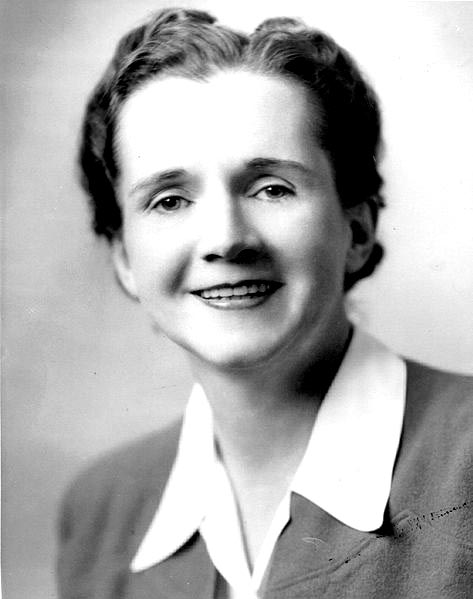Click to see Vol. I, Issue 7 of the newsletter in which this article first appeared.
Listen to the audio of this article!
Most of us today are aware of the need to take good care of the earth and the environment. This can be seen in today's emphasis on "envirotech" (environmental technology). In industry, businesses, and homes, "green technology" is almost a given, with heavy emphasis on renewable energy, purification of water and air, treatment of sewage and solid waste, and so on.
It was not always so.
There was a time when the oceans and the sky seemed illimitable, capable of absorbing whatever we could throw into them. One of the harbingers of the change in our attitudes and understanding was a quiet little woman with a big "voice." Rachel Carson (1907-1964) was trained as a marine biologist, and her first three books, Under the Sea Wind, The Sea Around Us, and The Edge of the Sea, concentrated on that specialty.
The Sea Around Us won a U.S. National Book Award, making Carson financially secure. As a result, she was able to write about her passion: conservation, what we often today call "ecology." Her fourth book, Silent Spring, literally changed the course of history. One Carson scholar has said, "Silent Spring altered the balance of power in the world. No one since would be able to sell pollution as the necessary underside of progress so easily or uncritically."
The book describes the environmental effects of overusing synthetic pesticides such as DDT. Chemicals sprayed on plants, she found, got into the water system--streams, rivers, and lakes--and killed wildlife, especially birds--thus, the season of spring would be silent: without birdsong. (Birds exposed to DDT would produce eggs with shells so thin they would crack before they hatched, or not hatch at all.) She accused the chemical industry of lying about the effects of such chemicals, and she accused the government of accepting the industry's claims without sufficient attempts at independent verification.
Silent Spring caused an uproar, with fierce pushback by chemical companies. As a result of her work, the government banned DDT nationwide, and a movement began, especially amongst American youth, that led to the creation of the Environmental Protection Agency (EPA) in 1970, the same year as the first Earth Day celebration. Numerous schools, a bridge, a trail, two research vessels, conservation areas, science and research prizes, and more have been named in her honor.
President Jimmy Carter awarded Rachel Carson the Presidential Medal of Freedom posthumously in 1980.
PRACTICE:
Vocabulary: Match the words to their meaning. Correct answers are in the first comment below.
- absorbing
- financially secure
- a given
- harbingers
- illimitable
- marine biologist
- pesticide
- posthumously
- pushback
- renewable
- synthetic
- uncritically
- underside
- uproar
- unable to be limited; boundless
- without thinking about it
- one who studies life in the sea
- able to be replaced
- not worried about money
- taking in; accommodating
- poison used on insects and rodents
- unseen part
- sign of a future event; person who foretells something
- disturbance; clamor
- something everybody assumes
- resistance; opposition
- after [someone's] death
- made in a laboratory; not natural
Questions to Answer: Answer the following questions in your own words. Suggested answers are in the first comment below.
- What are some elements of "green technology"?
- What training did Rachel Carson have?
- What was the effect of Carson's book, *Silent Spring?
- How were pesticides affecting wildlife, especially birds?
- What honor did Rachel Carson receive posthumously from President Jimmy Carter?
Questions to Think About: These questions do not have "right" or "wrong" answers. They only ask your opinion.
- Why did people feel the world was "illimitable"?
- Why is "green technology" important? Can you think of examples you've seen of "green technology"?
- Why would industry fight against environmental policies? Is that still happening today?



Answers:
ReplyDeleteVocabulary: 1. F; 2. E; 3. K; 4. I; 5. A; 6. C; 7. G; 8. M; 9. L; 10. D; 11. N; 12. B; 13. H; 14. J
Questions to Answer:
1. Renewable energy, purification of water and air, and treatment of sewage and solid waste are some elements of "green technology."
2. Rachel Carson was trained to be a marine biologist.
3. *Silent Spring caused industry and government to be more responsible in using synthetic pesticides. It also caused more awareness of environmental concerns.
4. Pesticides were getting into the water supply and making it difficult for birds to reproduce.
5. Rachel Carson received the Presidential Medal of Freedom posthumously from President Jimmy Carter.
Questions to Think About do not have any single correct answer. However, any answers you give should be supported by what you read or by things you know ("I think... because...").